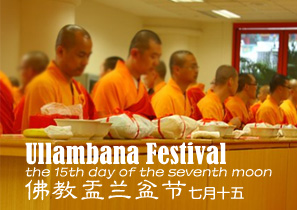A dejected Mahamaudgalyayana implore Buddha Sakyamuni to provide him a solution to the salvation for his mother. But Buddha answered; “her past sins are deep and huge for you alone to save”. Although your filial respect is admirable but are without sufficient strength. Hence, the noble spiritual power of the holy community of Monks – ‘Sangha’ from all ten directions is necessary for salvation to be restored.
Buddha advised Maudgalyayana to make the best offering of five fruits, incense, oil, lamps, candles, beds and bedding to the assembled order of monks of the ten direction at the end of the rainy retreat. In the retreat, members of the Sangha would dedicated themselves towards diligent Dharma practice and would gained much insights and realisations at the end of each retreat. Offering the Sangha on this day would help one to accumulate immerse merits. The merit gain through the offering to the Noble Sangha will not only redeem salvation for his mother but also all his kith and kin and forefathers . They would be rid of suffering and attain bliss by this virtuous act offering to the immeasurable field of merit of the Noble Sangha (spiritual community of practise).
Ullambana Festival : Significance
Ullambana festival chiefly reinforces the concept of filial piety. It signifies the importance of performing “good deeds” to accumulates spiritual merit by offering to the Noble Sangha (spiritual community of practice) and shares the merit with the departed , to help them reborn in good realms and end their suffering.
Legend of Ullambana has passed over ages and is celebrated by Buddhists all over, by holding ceremonies of charity to help the departed cross over to salvation. Thus, the 15th day of the seventh moon has become an Occasions for teaching the virtues of filial piety.
盂兰盆节
七月十五也是佛教盂兰盆节。盂兰盆,梵文Ullam-bana的音译。“盂兰”,倒悬的意思,倒悬形容苦厄之状,盆是指盛供品的器皿。佛教认为供此具可救度已逝去父母、亡亲的倒悬之苦。盂兰盆即“解倒悬”之意。佛典《佛说盂兰盆经》中记载了这么一个故事:
释迦牟尼佛的 十大弟子中神通第一的目连(亦称目键连),想报答父母的养育之恩,即用道眼视察,看到已逝去的母亲在饿鬼道中受苦,瘦得皮包骨头不成人 形。于是目连用钵盛饭,想送给母亲吃,但是饭刚送到他母亲手中,尚未入口即化为灰烬。目连请求佛陀帮助救度他的母亲。佛陀说:“你母亲罪孽深重,非你一人能救度,要靠十方贤圣僧众的道力才行,你要在七月十五日众僧结夏安居修行圆满的日子里,敬设盛大的盂兰盆供,以百味饮食供养十方贤圣僧众,依靠他们的道力, 方能救度您母亲。”目连照佛陀的指点去做,于是他的母亲真的脱离了饿鬼道。佛陀还说:“今后凡佛弟子行慈孝时,都可于七月十五日僧自恣日,即佛喜欢日(于佛 制每年一夏九十日间,僧众聚集一处安居,坚持戒律、皎洁其行,于最后一日,僧行自恣法,即请僧众举出各自所犯之过失,于大众中发露忏悔而得清净,自生喜悦,称为自恣。又十方诸佛欢喜其安居圆满之精进修行,故亦称佛欢喜日、欢喜日),备办百味饮食,广设盂兰盆供,供养众僧,这样做既可为在生父母添福添寿, 又可为已逝的父母脱离苦海,得到快乐,以报答父母的养育之恩。”
盂兰盆节的含义
在汉语系佛教地区,根据《佛说盂兰盆经》于每年七月十五日举行超度历代宗亲佛教仪式,称为盂兰盆法会、盂兰盆斋、盂兰盆供等。
佛教的七月十五的盂兰盆节,有两层涵义,一是教育人们要供养宗教僧众,二是教育人们多做善事超脱先人罪孽,并提倡孝道。

